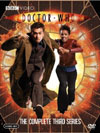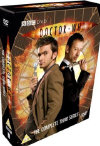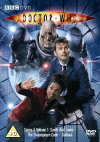DVD Extras (box sets only) include:
Of course, delving into Earth's past to demonstrate the time travel aspect of the show is predictable, as is a certain "-(yawn)- Let's not get too excited about this one" attitude on the part of the show's core sci-fi fans, myself included. And we're not leaving England either, so the TARDIS's ability to take us to explore new cultures isn't having its finest hour. However, all said and done, there's a certain educational flavour to the setting that goes right back to Doctor Who's roots in trying to alternate between teaching history and science. As just about every English-speaking highschool student gets some exposure to Shakespeare and a rough understanding of the culture and theatre he designed his works for, Doctor Who achieves a minor coup by not only recreating the era but also by going right back to the actual theatre and making it a central feature of an adventure. Nice one. Let's see if schools don't start showing this episode to students when they want to talk about the theatre of Shakespeare's day.
"What have butterflies ever done to you?"Sadly, as with the very first historical stories, the ugly old time-travel non-interference issues worry the writer and characters until they needlessly stick their feet in their mouths on the subject. Maybe the episode should be kept out of schools before popularizing the wrong idea. Yes, allowing a different version of history to unfold is an important possibility to maintain, in order to keep some suspense in the drama for the time travelers. (Donald Tosh could take some notes there.) But latching onto the one special effect in "Back to the Future" that completely buggers up its time travel integrity (and is still a disappointment to director Robert Zemeckis to this day) is a horrible idea.As we pointed out in our review for "Father's Day" (story no. 167), no version of history or element of a version of history that you remember is in danger of vanishing or fading away in a special effect. It always exists in its own universe parallel to whatever version you may be experiencing now. Characters are also allowed to speak freely and get time-travel theory wrong, but how disappointing to see the Doctor doing it when he was so brilliant at explaining where parallel universes came from last season. So sad.
"He's a bit different to his portraits!"Arguably the character of Shakespeare himself is open to some interpretation, since reportedly so little is known about him as a person himself. However, we do know what he looked like, thanks to his portraits, and he strikes me as an introverted type, who likes to be holed up with books, spending more time writing than was probably healthy. Dean Lennox Kelly comes out to play him with the image and style one would expect more from the leading man in a play than its writer though. A nice compelling character, mind you, but I have a hard time believing that that was Shakespeare. Passing off his signature collar as a period neckbrace also seems a bit cheap. Perhaps making him into a grand orator was all calculated to make the concluding action work? Not sure it was worth it.Yet another red flag goes up in the temporal mechanics field when the invention of several of Shakespeare's more famous quotes threatens to get caught in a time loop. Which came first, the chicken or the egg? If the Doctor recites Shakespeare's best lines back to him before he invents them, even though it was Shakespeare's writing that first put those lines in the Doctor's head, the original invention of the lines no longer exists. Of course, the constant every-choice-at-every-moment-creates-another-parallel-universe theory can easily render this a moot point, but since Gareth Roberts seems oblivious of this theory, I still wonder what his intent towards the source of these quotes was? If indeed it ever bothered him to think it through.
Style Over SubstanceFinally we come to the trio of adversaries that the Doctor and company need to contend with. The three characters maintain a decent standard set by Doctor Who villains without particularly standing out, or being too original. One can virtually expect the debunking of the supernatural to reveal scientific, extra-terrestrial roots, this time nicely not throwing out the supernatural entirely. But the extra-terrestrial side of things never really comes into its own. In this story, it just seems to be the usual, standard explanation, and remains underdeveloped. Equally underdeveloped are the nuts and bolts of the workings of the psychic energies that form the strategic battlefield of the story.The power of "naming" something might have a certain logic to it if we followed all the common psychic teaching available and limited that power to the degree that any one "victim" believed in it and in the person/creature wielding it. This is nicely born out by such power having less effect on modern Martha and none at all on the Doctor. But when explanations arise, more emphasis is put on the power of "naming" only working once. Silly. You need to go much deeper with explanations to make some scientific or logical sense out of that, and this story fails to make the journey. The Doctor also brings up a good question - what is allowing psychic power to operate at that scale without any technology to boost it? The story fails to answer. Our aliens use a technology of words (and shapes) instead of numbers. Ahh... what does that mean, exactly? I thought our technology used numbers and words, and shapes come from geometry which is also a lot of numbers. And listen to all the crazy numbers the aliens write into Shakespeare's play!
Final CurtainThe story climaxes with a decent spectacle and an attempt at some unusual dynamics. It is sad though that an ending that wordy is so difficult on the ear. One might be tempted to think that the sound and music is simply overpowering the dialogue, despite everyone having re-dubbed their lines in the studio. But even watching it the second time through, I couldn't understand what was being said without turning on the closed captions on my DVD. The words, phrases, and numbers are just too obscure and unnaturally sequenced to get any "top-down" help from the audience's perception mechanisms - in other words, it's too hard to guess if we should be hearing a verb or a definite object or a numerical sequence based on the words that just came before. This bizarre speech relies heavily on "ground-up" perception, where every syllable needs to be recognized by the ear hearing it, and there's too much of a cacophony for that. Too bad, because it actually displays a nice bit of cleverness, and the seed of a great idea.There's a great coda to this adventure, when an additional visitor arrives at the theatre, and a very cool interaction with the Doctor commences. One of the best moments of the story, not to be missed, and even foreshadowing the structure of "Blink" (story no. 190). Very cool.
International Titles:Deutsch: "Der Shakespeare Code"Magyar: "A Shakespeare kód"Français: "Peines d'amour gagnées"Русский: "Код Шекспира"Italiano: "Il codice shakespeariano"Interestingly, the French seem to be borrowing their title from the play Shakespeare is working on in the episode: "Love's Labours Won".
This story has become available on DVD:
Note: The full season sets contain commentaries, behind-the-scenes featurettes, and other extras. The smaller volumes only feature the plain episodes. Comments on this article are welcome. You may contact the author from this page:
|









